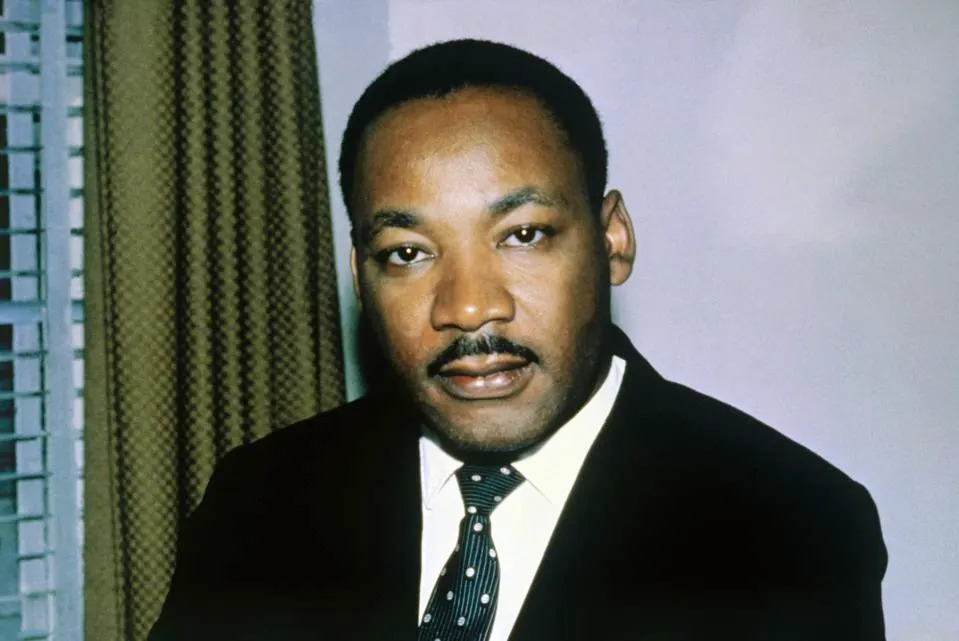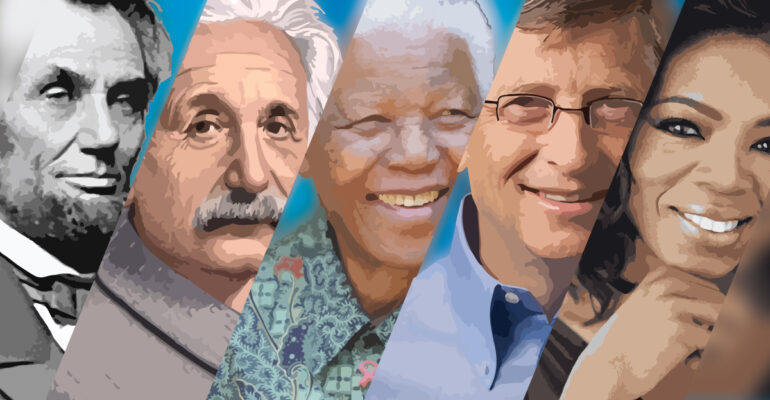Mastering Leadership: Extracting 10+ Key Insights from Inspirational Leaders
March 25, 2024 2024-07-01 15:05Mastering Leadership: Extracting 10+ Key Insights from Inspirational Leaders
Being in control or having a fancy job title aren’t the only aspects of leadership. It’s about having the ability to motivate and direct others toward a common goal. Over time, many people have shown great leadership qualities, leaving behind stories that inspire and teach.
In this article, we will examine some of the most inspirational leaders in history and the true meaning of leadership. We will also uncover practical insights that can improve anyone’s leadership.
Follow through!
Who is a good leader, and why?

A great leader is someone with a special mix of qualities that help them guide and motivate others well. These qualities include:
- Having a clear vision: A good leader knows where they want to go and can explain it excitedly.
- Being honest and fair: A leader should always tell the truth, be open, and have a strong sense of right and wrong.
- Understanding others: It’s important for leaders to listen to people’s feelings and problems to build trust and teamwork.
- Making tough choices: A good leader can decide what to do, even when it’s hard, and do it quickly.
- Being able to change: Leaders should be flexible and able to adjust when things don’t go as planned.
- Inspiring others: A good leader encourages and energizes their team with what they say and do.
- Taking responsibility: Leaders should admit when they’re wrong and make sure everyone does what they’re supposed to do.
Who is the most inspiring leader?
Many amazing leaders have existed over time, but one who really stands out is Mahatma Gandhi. He had a special belief in peaceful protest, which he called Satyagraha, and it played a huge part in India getting freedom from British rule.
Gandhi’s leadership had a few important lessons:
- Trusting in peace: Gandhi believed people were naturally good and that peaceful protests could create big changes in society and politics. By not using violence, he convinced many people to join the fight for freedom.
- Leading by example: Gandhi didn’t just talk about his ideas; he lived them every day. He lived a simple life, always thinking about others before himself. This made people admire him and follow him.
- Bringing people together: Gandhi thought it was really important to include everyone and work together. He brought people from different places and backgrounds together to fight for independence. He once said, “Our ability to come together despite our differences will show how great our civilization is.”
- Never giving up: Even when things got tough, Gandhi never stopped believing in his peaceful ways. He faced many problems but stayed strong in his fight for peace and fairness. His determination inspired others to keep going too.
Key Insights from other Inspirational Leaders
1. Winston Churchill – Strong Leadership During a Tough Time in History

Winston Churchill is remembered as one of the greatest leaders ever, especially for saving democracy.
He had a big job during World War II: leading Britain and its allies against the Nazis. His smart decisions, strong character, and never-give-up attitude helped Britain win the toughest war of the 1900s.
Churchill was born into a fancy family in 1874 and served in the British army. Before getting into politics, he wrote a lot. He became Prime Minister in 1940, right in the middle of World War II.
His road to becoming prime minister was long and hard. It took him 40 years! But when he finally got there, he became one of the best leaders of the 1900s.
He didn’t just help the US and Russia beat the bad guys; he also helped make peace after the war, leading to a great time of success for the western world.
Churchill’s way of leading was so good that people elected him Prime Minister again in 1951.
One of the coolest things about Churchill as an inspirational leader was how well he spoke. He could really connect with the whole country. He said lots of things during his life that still inspire leaders today.
2. Martin Luther King Jr. – Celebrated Civil Rights Activist who Forever Changed America

Not many Americans are as famous as Martin Luther King Jr., the minister and activist who fought for civil rights in the United States until he died tragically in 1968.
MLK was born in the rural South in 1929 and faced many challenges because he was African-American. He grew up in Atlanta, Georgia, where he wasn’t very interested in school and didn’t like religion very much.
But things started to change when he took a Bible class in his junior year. He found his faith again and went on to earn a degree from Morehouse College in 1948. MLK realized how unfair racial inequality was during his time at Morehouse College.
3. Nelson Mandela – A Man Who Fought for Freedom and Won

Nelson Mandela, South Africa’s first freely elected President, is known for his unwavering dedication and patience. His remarkable journey was so impressive that it was turned into a movie in 2013.
Like Martin Luther King, Jr., Mandela was a major civil rights leader in the 20th century. He led peaceful protests against the racist South African government and won the Nobel Prize in 1993 for helping to end apartheid.
Mandela wasn’t in it for politics or personal gain; he genuinely wanted to make life better for his people and believed in freedom and equality for all nations. Born in 1918, Mandela joined the civil rights movement as a young man and spent 20 years peacefully defying the apartheid government. He was even sent to prison in 1956 on treason charges but was later freed.
Realizing that peaceful protest wasn’t enough, Mandela joined the MK movement, a group fighting against apartheid. This led to his arrest in 1961 after organizing a national workers’ strike. He became leader of the African National Congress in 1962 and, in 1994, became South Africa’s first black president after the country’s first democratic elections.
4. Albert Einstein – Changing the Rules of Nature for the Betterment of People

Albert Einstein is perhaps the most famous scientist of the 20th century. The celebrated physicist greatly influenced our understanding of the universe, including basic ideas like time, light, and gravity.
Even today, scientists use his theories to explore new areas, helping us grasp our significance in the biggest way possible.
Born in Germany in 1879, Einstein was a bit different from other boys. He had a big head and didn’t talk much, which led one housekeeper to call him “slow.” But this “slow” boy would later reshape the world with his ideas.
At just 26, Einstein got his PhD. That same year, he wrote four important papers about light and mass-energy equivalence. Einstein faced many challenges, from physical issues as a boy to struggling to find work after college.
His positive attitude and creative thinking were key to his brilliance. More than 60 years after he died, the world remembers him not as a patent office worker, but as a man who changed everything.
5. Abraham Lincoln – A Symbol of Freedom and Hero of the Slaves

Abraham Lincoln wasn’t just an American hero; he represented a new beginning for human civilization, focused on freedom, self-rule, and fairness.
Born in a small cabin in Kentucky in 1809, Lincoln’s life was tough from the start. His mother died when he was only 9, leaving him devastated. His stepmother, though, encouraged him to read, which shaped his future.
Growing up in Indiana, Lincoln didn’t get much schooling. He only had about a year and a half of formal education. Despite this, he became the leader of the Union during the Civil War. His powerful speeches, like the Gettysburg Address, helped him gain support from the American people.
Even today, Lincoln is a symbol of freedom, democracy, fairness, and bringing people together. His bravery in standing up for what he believed in made him one of the most loved leaders in history.
6. St. Teresa of Calcutta (Mother Teresa) – Nobel Lauriat Determined To Ease Suffering In The World

Mother Teresa, also known as St. Teresa of Calcutta, dedicated her life to helping the world’s poorest and most vulnerable people.
Her exceptional leadership skills were evident even in times of conflict, like during the 1982 Siege of Beirut. She arranged a temporary truce between the warring sides to rescue 37 children from a hospital caught in the crossfire. The devastating 1943 Bengal famine deeply affected Mother Teresa, prompting her to leave her teaching job and devote herself to helping the poor.
Moving into the slums, she faced hunger and homelessness but still managed to start a school for underprivileged children, teaching them basic skills with simple materials.
Her efforts gained attention, and soon a community formed around her, establishing hospices, clinics, and orphanages across India and later around the world.
You should definitely read this: 10+ Leadership Books for Managers and Business Owners
7. Bill Gates – The Entrepreneur Who Changed the World

Bill Gates grew up in Seattle, Washington, in a well-off family. He was really close to his mom and showed signs of being really smart from a young age, especially in business.
When he was just 15, Gates started a business with his friend Paul Allen. They didn’t know it then, but five years later, they would change the way the world does business and talks to each other.
In 1975, Gates and Allen started Microsoft. They put all their energy into it. Gates had big ideas, a strong business plan, and worked harder than anyone else. Microsoft became the biggest tech company in the world, and Gates got really rich.
By 1981, Microsoft had 128 workers and had made $16 million. Just two years later, it went global. For more than 20 years, Gates has been one of the richest people in the world. In 2016, Forbes said he was the richest. But he had to work really hard for all that money.
Gates spent a lot of time making Microsoft great in a tough market. He only stopped being the chairman in 2014 but still helps with tech stuff. Today, Microsoft makes almost $100 billion every year and has 120,000 workers worldwide.
But Gates isn’t just about Microsoft. He and his wife Melinda give a lot of money to help people around the world. They’ve set up a $44 billion fund to improve healthcare and reduce poverty.
8. Oprah Winfrey – Inspiring Women to Succeed Against All Odds

Oprah Winfrey isn’t just a TV host; she’s a powerful business leader who shapes popular culture and society.
From a rural area in Mississippi, Oprah has achieved incredible success, overcoming huge challenges along the way.
Growing up as a black woman in the South, Oprah faced many obstacles. She endured terrible abuse as a child, but she didn’t let that stop her.
In the 1970s and 1980s, it was rare for someone like Oprah, with her background and being a double minority, to make it in show business.
Yet, Oprah didn’t stop at TV. She also started Oprah’s Book Club, promoting reading and helping unknown authors get noticed.
Her generosity extends beyond TV and books. Through her charities, Oprah has raised millions to help children and those in need worldwide.
9. Stephen Hawking – The Scientist Who Showed That Determination Can Beat Any Obstacle

Diagnosed with ALS at 21, Stephen Hawking spent most of his life with severe disabilities, controlling his communication device with his cheek muscles.
Despite his condition, he became one of the most famous physicists since Einstein, known for his work on cosmology and black holes.
Born in England during World War II, Hawking wasn’t a big fan of studying but still graduated with top honors before getting a PhD in cosmology at Cambridge University.
His refusal to let his disabilities hold him back is clear in his attitude. According to his ex-wife, Jane Hawking, Stephen’s determination and stubbornness played a big part in his outlook on life. And as Hawking shows, both traits have their advantages.
Scorecard on Extracting 10+ Key Insights from Inspirational Leaders (Pdf.)
If you have read up until this point, it is important to find out if this article meets your expectations. To ascertain whether it did, below are a few questions you should answer to get through mastering leadership.
Related Article: 12+ Constructive Feedback Examples for Leadership
FAQs on Inspirational Leaders
What role does storytelling play in inspiring leadership?
Storytelling is a powerful tool used by inspirational leaders to convey their vision, values, and experiences. By sharing compelling narratives, leaders can connect with others on an emotional level, inspire empathy and understanding, and galvanize support for their cause or mission.
How do inspirational leaders overcome obstacles and setbacks?
Inspirational leaders often demonstrate resilience, determination, and a positive attitude in the face of obstacles and setbacks. They view challenges as opportunities for growth, learn from failure, and remain focused on their long-term goals despite temporary setbacks.
How can I become an inspirational leader?
To become an inspirational leader, focus on developing qualities such as authenticity, empathy, integrity, and a clear vision for the future. Lead by example, inspire trust and confidence in others, and prioritize the well-being and growth of your team or community.
What can we learn from inspirational leaders?
Inspirational leaders teach us valuable lessons about courage, perseverance, compassion, and the power of resilience. They demonstrate the importance of standing up for what is right, even in the face of adversity, and show us that positive change is possible through determination and collective action.
Conclusion
Leadership is complex and encompasses a wide range of traits and methods. Through examining the teachings of influential figures such as Mahatma Gandhi, you can gain important insights and direction on how to lead more successfully in our communities and lives. Great leaders inspire future generations with their lessons of unity, inclusivity, and advocacy for positive change. The principles they impart can be applied to any area of leadership.




